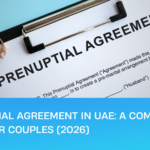What Makes Your Power of Attorney Invalid?

✅ Quick Summary about When Power of Attorney Becomes Invalid
A Power of Attorney in the UAE becomes invalid in the following scenarios:
- Upon expiry of its term.
- Upon death of the principal or the agent.
- Upon liquidation or deregistration of a company involved.
- Upon revocation by the principal.
- Upon reaching the time limits imposed by law (e.g., two-year limit on property sale POAs in Dubai).
- Upon fulfilment of the stated purpose.
Outside of these circumstances, a POA can remain valid indefinitely—provided it is carefully drafted, legally notarized, and aligned with your actual goals.
When and Why a Power of Attorney Becomes Invalid in the UAE
A Power of Attorney (POA) is one of the most useful legal instruments for both individuals and businesses in the UAE. It allows someone (the “Agent” or “Attorney”) to act on behalf of another person or legal entity (the “Principal”) for specific matters such as selling property, managing bank accounts, dealing with company matters, or representing them in legal cases.
Many people assume that once a POA is issued, especially if drafted with an unlimited term, it will remain valid indefinitely. However, this is not the case.
Related: Types of Power of Attorney in the UAE
There are several circumstances under which a POA can lose its validity. Some are straightforward and universally understood, while others are governed by UAE-specific laws and regulations that many people are unaware of. Understanding these scenarios is crucial, as it helps you avoid legal complications and ensures your affairs are managed as intended.
Common Reasons Why a POA Becomes Invalid
1. Revocation by the Principal or Agent
The most direct way a POA becomes invalid is when the Principal (the person who granted the POA) or even the Attorney (the person authorized or appointed to act on behalf of the Principal) revokes it. Revocation is a legal act that must be notarized in the UAE. Once revoked, the POA can no longer be used under any circumstances, and if someone continues to act under its authority, their actions may be considered unauthorized.
Related: Revocation of Power of Attorney in the UAE↗
2. Death of the Principal or the Agent
Another situation that automatically invalidates a POA is the death of either the Principal or the Attorney. In such cases, the POA ceases to exist entirely. It’s important to note that a POA cannot serve as a substitute for a Will. This is why it is important to ensure other legal arrangements, such as a Will, are in place to cover unforeseen circumstances.
3. Expiry of the Specified Term
If a POA includes a validity period (for example, one year from the date of issuance); it automatically expires once that period ends. This applies even if the parties continue to act as though it is valid. After expiry, a new POA must be issued if authority is still required.
4. Fulfillment of the Stated Purpose
A POA also becomes invalid once its intended purpose has been fulfilled. For instance, if a POA is issued specifically to sell a property and the property is successfully transferred to a new owner, the POA automatically becomes void. It cannot be reused for any other property sale or transaction beyond the original scope.
5. Legal Restrictions and Time Limits
Certain POAs are subject to restrictions imposed by UAE law and government authorities, which can shorten their validity regardless of the validity. A perfect example is in Dubai, where the Dubai Land Department (DLD) limits the validity of property sale POAs to two (2) years and property purchase POAs to five (5) years from the date of issuance. Even if the POA states an unlimited term, it becomes unenforceable after these number of years for real estate transactions. Additionally, POAs issued outside the UAE are generally recognized for a maximum period of one (1) year.
Related: How to Prepare a UAE Power of Attorney from Abroad↗
These legal restrictions are designed to protect property owners and ensure that POAs are not misused for outdated or unauthorized purposes.
Other Factors That Can Affect the POA Validity
-
Errors in Drafting or Wording
Spelling errors in names, vague descriptions of powers, or ambiguous wording will not necessarily invalidate a POA, but they can make it challengeable in court or rejected by government authorities. This is why professional drafting and careful review are essential.
Related: Learn more about Drafting a Power of Attorney in Dubai
-
Changes in Passport or Citizenship
Renewing a passport or acquiring new citizenship does not automatically invalidate a POA. However, it may cause practical issues if the document references old passport numbers or nationality details. To avoid delays, it is advisable to keep copies of old passports and update the relevant authorities about any changes.
-
Company Deregistration or Liquidation
When a POA is issued by or to a company, the validity of that POA is tied to the company’s existence. If the company is deregistered, liquidated, or struck off from the commercial register, the POA automatically becomes invalid.
Why It’s Important to Keep Your POA Updated
A POA is often relied upon in critical situations such as property sales, inheritance matters, or corporate transactions. If it becomes invalid without the parties realizing it, the consequences can be serious: rejected transactions, financial loss, or lengthy legal disputes. For instance, imagine attempting to sell property with a POA that has already expired under DLD rules—the sale simply cannot proceed, and valuable time is lost.
That’s why it’s not enough to simply issue a POA and forget about it. Regular reviews are essential, especially when significant life events occur—such as marriage, divorce, relocation, or changes in business ownership.
Final Thoughts
A Power of Attorney in the UAE is a powerful tool, but it is not immune to limitations. Knowing when and how a POA becomes invalid allows you to plan more effectively and avoid unpleasant surprises. If you want your POA to serve its purpose reliably, always ensure it is professionally drafted, up to date, and compliant with UAE laws.
Whether for personal or business matters, taking a few extra steps to understand and maintain the validity of your POA can save you and your loved ones from future complications. Think carefully about what you want your POA to achieve, and review it regularly with legal experts who can guide you through the latest requirements. By doing so, you make sure your POA remains intentional, purposeful, and legally sound.
💡 Need help drafting or renewing your Power of Attorney in the UAE?
Our legal specialists will guide you through every step — from drafting and notarization to attestation and revocation.
📩 contact@poa.ae | ☎️ 800-POAAE (76223)
Let us simplify the process and ensure your Power of Attorney remains valid and compliant with UAE law.
FAQs About Power of Attorney in the UAE
1) Does a POA replace a Will in the UAE?
No. A Power of Attorney ends when either the Principal or the Attorney dies, and it cannot distribute assets after death. A Will (or court order) is required to manage and transfer assets post-death.
2) How long is a property-related POA valid in Dubai?
As a rule of thumb, DLD accepts sale POAs up to 2 years old and purchase POAs up to 5 years old from issuance. As per DLD’s latest update, POAs issued outside the UAE are generally recognized for a maximum period of one (1) year.
3) How do I revoke (cancel) a POA in the UAE?
The Principal (or the Attorney resigning) must notarize a revocation. Then notify all relevant parties, such as banks, DLD/trustee office, developers, or courts, so they stop honouring it. If the POA was issued abroad, the relevant parties must revoke it with the same foreign notary and legalize (UAE Embassy) and attest (UAE MOFA) copies for use in the UAE.
4) Can I reuse a special-purpose POA after the task is done?
No. If the POA was issued for a specific purpose (e.g., selling a named property), it expires by fulfillment once that transaction is completed and cannot be used for other sales or unrelated actions.
Disclaimer: The content on this page is for general information purposes only and does not constitute as legal advice nor should it be used as a basis for any specific action or decision. Nothing on this page is to be considered as creating a lawyer-client relationship or as rendering of legal advice or legal services for any specific matter. Users of this website are advised to seek specific legal advice from their lawyer or a legal counsel regarding any specific legal issues.





